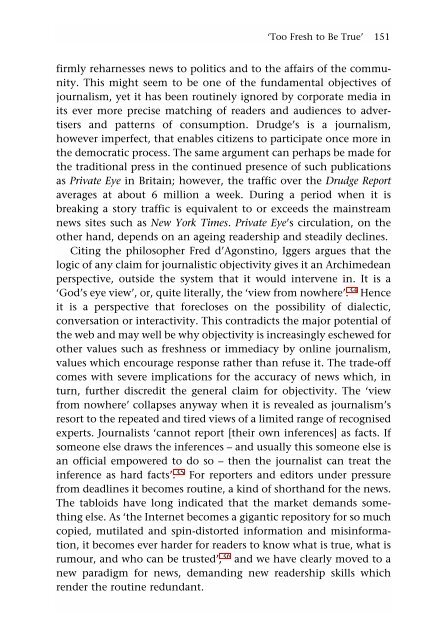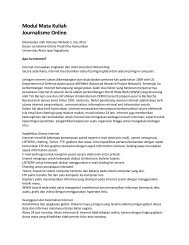Online Journalism - Ayo Menulis FISIP UAJY
Online Journalism - Ayo Menulis FISIP UAJY
Online Journalism - Ayo Menulis FISIP UAJY
You also want an ePaper? Increase the reach of your titles
YUMPU automatically turns print PDFs into web optimized ePapers that Google loves.
‘Too Fresh to Be True’ 151<br />
firmly reharnesses news to politics and to the affairs of the community.<br />
This might seem to be one of the fundamental objectives of<br />
journalism, yet it has been routinely ignored by corporate media in<br />
its ever more precise matching of readers and audiences to advertisers<br />
and patterns of consumption. Drudge’s is a journalism,<br />
however imperfect, that enables citizens to participate once more in<br />
the democratic process. The same argument can perhaps be made for<br />
the traditional press in the continued presence of such publications<br />
as Private Eye in Britain; however, the traffic over the Drudge Report<br />
averages at about 6 million a week. During a period when it is<br />
breaking a story traffic is equivalent to or exceeds the mainstream<br />
news sites such as New York Times. Private Eye’s circulation, on the<br />
other hand, depends on an ageing readership and steadily declines.<br />
Citing the philosopher Fred d’Agonstino, Iggers argues that the<br />
logic of any claim for journalistic objectivity gives it an Archimedean<br />
perspective, outside the system that it would intervene in. It is a<br />
‘God’s eye view’, or, quite literally, the ‘view from nowhere’. 34 Hence<br />
it is a perspective that forecloses on the possibility of dialectic,<br />
conversation or interactivity. This contradicts the major potential of<br />
the web and may well be why objectivity is increasingly eschewed for<br />
other values such as freshness or immediacy by online journalism,<br />
values which encourage response rather than refuse it. The trade-off<br />
comes with severe implications for the accuracy of news which, in<br />
turn, further discredit the general claim for objectivity. The ‘view<br />
from nowhere’ collapses anyway when it is revealed as journalism’s<br />
resort to the repeated and tired views of a limited range of recognised<br />
experts. Journalists ‘cannot report [their own inferences] as facts. If<br />
someone else draws the inferences – and usually this someone else is<br />
an official empowered to do so – then the journalist can treat the<br />
inference as hard facts’. 35 For reporters and editors under pressure<br />
from deadlines it becomes routine, a kind of shorthand for the news.<br />
The tabloids have long indicated that the market demands something<br />
else. As ‘the Internet becomes a gigantic repository for so much<br />
copied, mutilated and spin-distorted information and misinformation,<br />
it becomes ever harder for readers to know what is true, what is<br />
rumour, and who can be trusted’, 36 and we have clearly moved to a<br />
new paradigm for news, demanding new readership skills which<br />
render the routine redundant.
















